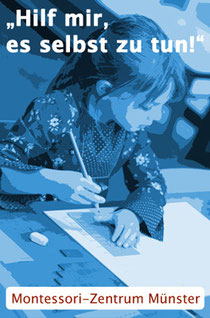Individualised Learning has to be Related to Social Education and Integration
The different family situation, in which a lot of children grow up as only children and have no sufficient opportunity to have social experiences with siblings or children from next door, requires a higher degree of social-educational commitment from educational institutions than in earlier times.
In view of this social-integrative and social-educational objective of schools and nursery schools, it would be disastrous if this aim were affected by the individualisation within the framework of free work. However, this is not the case. On the contrary, the concentrated work of a child has a positive effect on his whole personality, including the emotional and ethical-social dimension. The acceptance of one’s own personality and identity, the experience of one’s own individuality and the self-esteem resulting from it are basic prerequisites for social behaviour.
The numerical limitation of the teaching material helps the children to learn consideration, empathy and patience. The mixed age groups favour the development of the ability to distance oneself from one’s own role and generally foster the moral development. A natural helper system develops among the children. Changing social forms such as individual, partner and group work make it possible to practise different social relationships, which is made easier by the principles of free movement and open doors. The positive social-educational and social- integrative effect of free work is verified by recent empirical studies. One can even say that the structure of free work creates the very pre-conditions for an intense co-operation between the children.
The Munich experiment of Professor Theodor Hellbrügge, PhD on the integration of disabled and non-disabled children has elucidated this social-integrative effect of Montessori Education (cf. Theodor Hellbrügge, Unser Montessori-Modell, München 1977). The experiment also proved that in the framework of Montessori free work another problem can be solved that is frequently discussed in the context of the common teaching of children of different capabilities, namely the apprehension of negative effects on the more talented children. One can rather emphasise that even the fostering of highly gifted pupils — a problem that is discussed a lot today — seems to be possible within the framework of such a flexible teaching structure that Montessori free work offers (cf. Harald Ludwig, “Jedes Kind ist anders – Montessori-Pädagogik und die Förderung individueller Begabungen”, in: Montessori — Zeitschrift für Montessori Pädagogik 34 (1996) 87-103; F.J. Mönks, I.H. Ypenburg, Unser Kind ist hochbegabt — Ein Leitfaden für Eltern und Lehrer, München/Basel 1993).

 Kompetenz in Montessori-Pädagogik
Kompetenz in Montessori-Pädagogik
